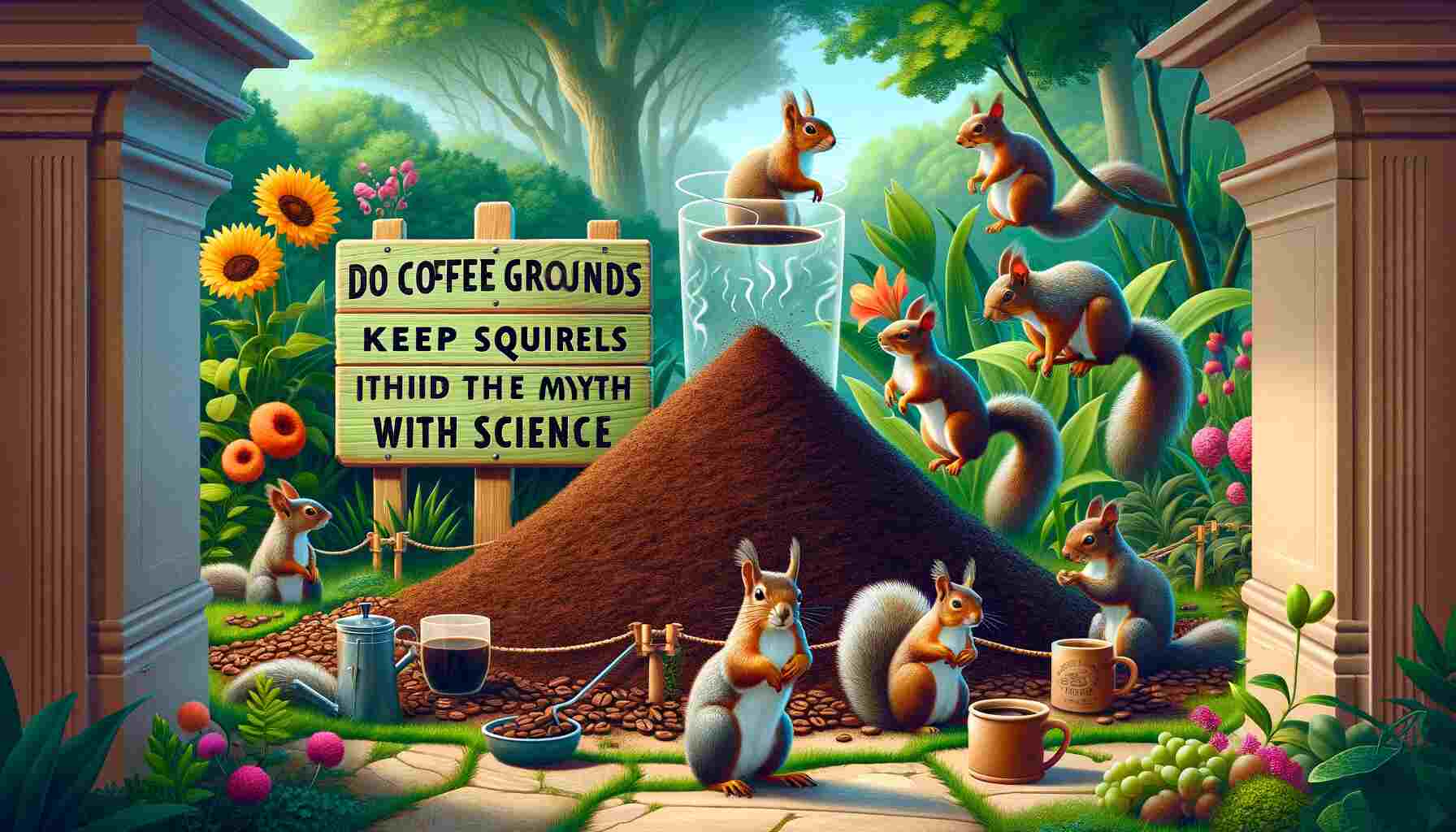Squirrels can be charming creatures, darting around our gardens and parks with their bushy tails and playful antics. However, they can also be a source of frustration for homeowners and gardeners. Squirrels often raid bird feeders, dig up flower bulbs and chew on tree branches. To combat this, many people have turned to various methods to deter these furry foragers, including the use of coffee grounds. But do coffee grounds really keep squirrels away, or is this just a myth?
Yes, coffee grounds will keep squirrels away from your garden due to their strong scent, which many squirrels find unpleasant. To utilize this method, you can lightly sprinkle fresh coffee grounds around the base of your plants roughly every week.
However, this might not work every time.
In this article, we will explore the effectiveness of coffee grounds as a squirrel deterrent and delve into the science behind it.
Understanding Squirrel Behavior
Before we delve into the potential deterrent qualities of coffee grounds, it’s important to understand why squirrels can become a nuisance. Squirrels are known for their love of nuts and seeds, and they have sharp teeth that continuously grow, making them prone to gnawing on various objects to keep their teeth in check. This behavior can lead them to raid bird feeders and damage plants and trees in your garden.
Squirrels are also persistent and adaptable animals. If they find a food source they like, they will keep coming back for more. This can be a source of frustration for those trying to maintain a squirrel-free environment.
The Coffee Grounds Myth
The idea that coffee grounds can deter squirrels likely stems from their strong smell. Coffee has a potent aroma that many humans find invigorating, but animals, including squirrels, often find it overpowering and unpleasant. Some people believe that sprinkling coffee grounds in their garden or around bird feeders will repel squirrels due to the scent.
However, it’s important to note that the effectiveness of coffee grounds as a squirrel deterrent is largely anecdotal. While some individuals swear by this method, others report that squirrels are not deterred by coffee grounds at all. So, does it work, or is it just wishful thinking?
Scientific Research: What the Studies Say
To better understand whether coffee grounds can deter squirrels, let’s examine the science behind it. While there’s limited scientific research specifically on coffee grounds as a squirrel deterrent, a study published in the Journal of Pest Management found that the scent of coffee grounds did deter some rodents, including rats and mice. However, squirrels, being highly adaptable, may not be as easily deterred by scent alone.
The Science Behind Coffee Grounds
Coffee grounds are rich in nitrogen, which is an essential nutrient for plant growth. When used as a fertilizer, coffee grounds can provide valuable nitrogen to the soil, promoting healthier plants.
However, the smell of coffee grounds is not universally disliked by all animals. While some animals find it repulsive, others may be indifferent or even attracted to it. Squirrels, like many rodents, have a keen sense of smell, and they use it to locate food sources. The scent of coffee grounds may initially deter them, but squirrels are known for their ability to adapt to new odors over time.
Additionally, coffee grounds are not toxic to squirrels, so they are unlikely to cause harm if ingested. This means that if a squirrel is particularly determined to access a food source in your garden, the presence of coffee grounds alone may not be enough to keep them away.
Pros and Cons of Coffee Grounds as a Deterrent
It’s worth considering the pros and cons of using coffee grounds as a squirrel deterrent:
Pros:
- Coffee grounds can act as a natural fertilizer, enriching the soil in your garden.
- They are a safe and non-toxic option for deterring squirrels.
Cons:
- The effectiveness of coffee grounds as a deterrent is variable and may not work for all squirrels.
- Squirrels may adapt to the scent over time, making the deterrent less effective.
Other Squirrel Deterrent Methods Keep Squirrels Away
While coffee grounds may have a mixed record when it comes to deterring squirrels, there are other methods that have shown more consistent results. Here are some alternatives to consider:
1. Squirrel-Proof Bird Feeders
Investing in squirrel-proof bird feeders can be an effective way to keep squirrels from raiding your bird feed. These feeders are designed with mechanisms that prevent squirrels from accessing the food while still allowing birds to feed.
2. Use Squirrel Repellent Sprays
Squirrel repellent sprays are available in the market and can be applied to bird feeders, plants, and other areas where squirrels are a problem. These sprays often have a bitter taste or an unpleasant odor that deters squirrels.
3. Install Physical Barriers
Installing physical barriers like metal mesh or netting around plants and trees can prevent squirrels from accessing them. This method can be particularly effective for protecting vulnerable flower bulbs and tree bark.
4. Provide Squirrel-Friendly Alternatives
Consider placing squirrel feeders filled with nuts or seeds in a separate area of your garden to divert the squirrels’ attention away from your bird feeders and plants. This can be a more humane way to coexist with these creatures.
Environmental Considerations
It’s important to consider the environmental impact of using coffee grounds in the garden. Coffee grounds can be a valuable addition to your soil, providing nutrients that benefit plants. By using them as a deterrent, you are also contributing to soil health and sustainability in your garden.
Frequently Asked Questions
Here are some common questions readers might have about deterring squirrels:
Q: Can coffee grounds harm other garden plants? A: Coffee grounds, when used in moderation, can be beneficial to most garden plants. However, it’s advisable not to use excessive amounts, as this can affect the pH of the soil.
Q: What are some signs that squirrels are in my garden? A: Signs of squirrels in your garden include chewed plants, raided bird feeders, holes in the ground (where they bury nuts), and the presence of squirrel nests in trees.
Conclusion and Actionable Advice
In conclusion, while the idea of using coffee grounds as a squirrel deterrent may have some merit due to their strong odor, their effectiveness is far from guaranteed. Squirrels are intelligent and adaptable animals, and they may eventually overcome their aversion to the scent.
If you’re dealing with a persistent squirrel problem like we had in the past it’s advisable to explore other proven methods of squirrel deterrence, such as squirrel-proof bird feeders, repellent sprays, physical barriers, and providing alternative food sources. Combining multiple strategies may be the most effective way to keep squirrels at bay.
Ultimately, when it comes to managing squirrel-related issues in your garden, it’s essential to strike a balance between protecting your plants and appreciating the wildlife that shares your outdoor space. Squirrels are a natural part of many ecosystems, and finding humane and effective ways to coexist with them is often the best approach.








